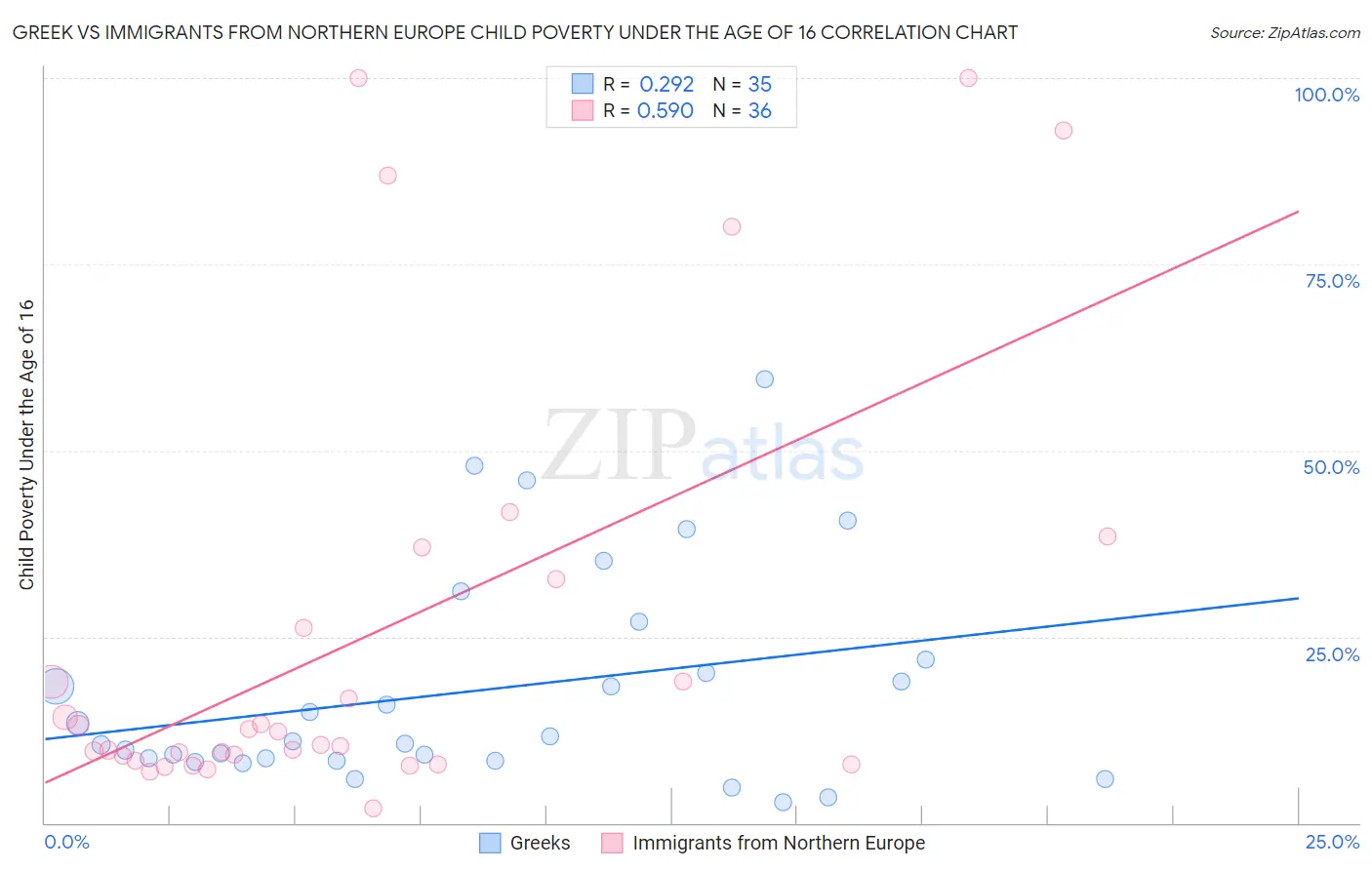Greek vs Immigrants from Northern Europe Child Poverty Under the Age of 16
COMPARE
Greek
Immigrants from Northern Europe
Child Poverty Under the Age of 16
Child Poverty Under the Age of 16 Comparison
Greeks
Immigrants from Northern Europe
13.8%
CHILD POVERTY UNDER THE AGE OF 16
99.3/ 100
METRIC RATING
44th/ 347
METRIC RANK
13.6%
CHILD POVERTY UNDER THE AGE OF 16
99.6/ 100
METRIC RATING
36th/ 347
METRIC RANK
Greek vs Immigrants from Northern Europe Child Poverty Under the Age of 16 Correlation Chart
The statistical analysis conducted on geographies consisting of 475,284,984 people shows a weak positive correlation between the proportion of Greeks and poverty level among children under the age of 16 in the United States with a correlation coefficient (R) of 0.292 and weighted average of 13.8%. Similarly, the statistical analysis conducted on geographies consisting of 470,069,037 people shows a substantial positive correlation between the proportion of Immigrants from Northern Europe and poverty level among children under the age of 16 in the United States with a correlation coefficient (R) of 0.590 and weighted average of 13.6%, a difference of 1.7%.

Child Poverty Under the Age of 16 Correlation Summary
| Measurement | Greek | Immigrants from Northern Europe |
| Minimum | 2.8% | 2.0% |
| Maximum | 59.6% | 100.0% |
| Range | 56.9% | 98.0% |
| Mean | 17.8% | 25.2% |
| Median | 11.0% | 11.4% |
| Interquartile 25% (IQ1) | 8.3% | 8.7% |
| Interquartile 75% (IQ3) | 22.0% | 29.4% |
| Interquartile Range (IQR) | 13.6% | 20.7% |
| Standard Deviation (Sample) | 14.3% | 28.9% |
| Standard Deviation (Population) | 14.1% | 28.5% |
Demographics Similar to Greeks and Immigrants from Northern Europe by Child Poverty Under the Age of 16
In terms of child poverty under the age of 16, the demographic groups most similar to Greeks are Czech (13.8%, a difference of 0.050%), Immigrants from Moldova (13.8%, a difference of 0.17%), Immigrants from Sri Lanka (13.8%, a difference of 0.23%), Croatian (13.8%, a difference of 0.31%), and Immigrants from Asia (13.8%, a difference of 0.34%). Similarly, the demographic groups most similar to Immigrants from Northern Europe are Immigrants from Bolivia (13.6%, a difference of 0.010%), Lithuanian (13.5%, a difference of 0.24%), Russian (13.5%, a difference of 0.44%), Luxembourger (13.6%, a difference of 0.52%), and Immigrants from Australia (13.6%, a difference of 0.55%).
| Demographics | Rating | Rank | Child Poverty Under the Age of 16 |
| Turks | 99.7 /100 | #30 | Exceptional 13.4% |
| Danes | 99.7 /100 | #31 | Exceptional 13.4% |
| Tongans | 99.7 /100 | #32 | Exceptional 13.4% |
| Asians | 99.6 /100 | #33 | Exceptional 13.5% |
| Russians | 99.6 /100 | #34 | Exceptional 13.5% |
| Lithuanians | 99.6 /100 | #35 | Exceptional 13.5% |
| Immigrants | Northern Europe | 99.6 /100 | #36 | Exceptional 13.6% |
| Immigrants | Bolivia | 99.6 /100 | #37 | Exceptional 13.6% |
| Luxembourgers | 99.5 /100 | #38 | Exceptional 13.6% |
| Immigrants | Australia | 99.5 /100 | #39 | Exceptional 13.6% |
| Immigrants | Scotland | 99.4 /100 | #40 | Exceptional 13.7% |
| Croatians | 99.4 /100 | #41 | Exceptional 13.8% |
| Immigrants | Sri Lanka | 99.3 /100 | #42 | Exceptional 13.8% |
| Immigrants | Moldova | 99.3 /100 | #43 | Exceptional 13.8% |
| Greeks | 99.3 /100 | #44 | Exceptional 13.8% |
| Czechs | 99.3 /100 | #45 | Exceptional 13.8% |
| Immigrants | Asia | 99.2 /100 | #46 | Exceptional 13.8% |
| Estonians | 99.2 /100 | #47 | Exceptional 13.9% |
| Koreans | 99.2 /100 | #48 | Exceptional 13.9% |
| Italians | 99.2 /100 | #49 | Exceptional 13.9% |
| Immigrants | Czechoslovakia | 99.1 /100 | #50 | Exceptional 13.9% |